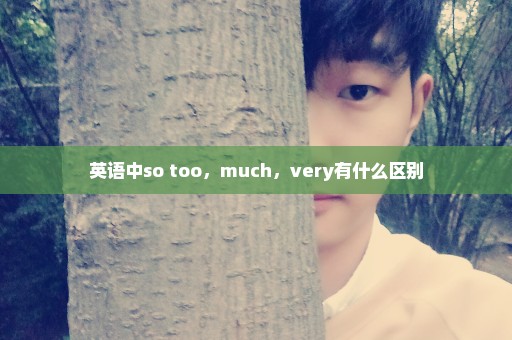英语中so too,much,very有什么区别
so 的用法:
1、作副词时,表示程度,意为“这么 / 那么、那样”.
1)用于否定句中,后面跟 as .例如:
It was not so easy as all that.
2)用于否定句中.例如:
Don't speak so loudly.
3)用于感叹句,带感情色彩的句子或一些其他的句子中.例如:
I'm so glad to see you!
Why are you so foolish?
2、作方式副词,表示“状态、方式”,意为“这样”.用法:
1)和 do 连用,表示前面说到的那个动作.例如:
It's my duty to do so.
2)和 say,tell,think,suppose 等动词连用,代替一个宾语从句.例如:
A :Are you going to watch the volleyball mach?
B :I hope so.
3)和某些其它动词连用,表示“方式”或“程度”.例如:
So the story goes.
4)和 be 连用.例如:
Is that so?
He is a lazy boy and will always be so.
3、作代词,表示“也这样”,指某人或前面提到的情况.例如:
He likes music.So do I.
She lived here for five years.So did she.
4、作连词,意为“因此、所以”.用法如下:
1)so 引起的句子不放在句首,而是和前面的句子相连.这种情况下在句中不能再使用 because ,若用了 because 就不能再用 so .例如:
You aren't listening,so I'll shut up.
= Because you aren't listening,I'll shut up.
2)放于句首,用来表示惊讶地发现某种情况,意为“原来;这样说来”.例如:
So you don't like the milk!
5、so 当“这些;这样”讲时,so 是副词,修饰形容词或副词.用法如下:
1)so + adj.
She is so young that she can't go to school by herself.
2)so + adj.+ a / an + 单数可数名词.
He is so funny a man.
3)so + many / few ( + adj.)+ 复数可数名词.
She gave me so many interesting books.
4)so + much / little ( + adj.)+ 不可数名词.
There is so much time for you.
5)so + adv.
I got up so late that I couldn't catch the early bus.
much的用法:
1、much 作定语,修饰不可数名词,一般不作表语.例如:
I have much homework to do this evening.
2、much 作定语,常用于疑问句、否定句或条件状语从句中,在纯粹的肯定句中最好用 plenty of .例如:
There isn't much food in the fridge.
3、much 用来修饰比较级和最高级,修饰最高级时应在定冠词 the 之前.例如:
She is much better now.
This is much the best.
4、too much 意思是“太多;太多的”,后面可以接名词,也可以单独使用;much 后接形容词、副词,是 much 与 too,more,rather 连用加强语气的用法,意为“极其;非常”.例如:
It's much too cold.
I have too much work to do today.
too的用法:
too 意为“太”、“过分”,表示超过容许的程度,一般只用于表示“坏”的内容.例如:
The coat is too small for me to wear.
very 与 much 的区别:
1、very 不能修饰动词的过去分词,much 则可以.例如:
I don't swim much.
Do you see her much?
I like the bicycle very much.
I was much surprised at what she said.
2、very 不能修饰形容词或副词的比较级,much 则可以.例如:
The book is much more interesting than that one.
The box is much heavier than that one.
3、very 不能修饰以“ a- ”开头的、只能作表语的形容词,如 afraid,alone 等,但 much 则可以.asleep 可以受 fast 修饰.例如:
I'm much afraid that we'll be late.
He is fast asleep.
4、介词短语有时可以用 much 修饰,但不用 very .例如:
Much of her joy,she found the seagulls had come to eat not the crops,but the locusts.
5、much 不能修饰形容词或副词原级,very 则可以.例如:
He ran very fast.
The movie is very interesting.
6、very 不能修饰用在被动语态中表示被动的过去分词,但可用来修饰表示性质和状态的过去分词,该过去分词已经具备形容词词性,常被用作表语或定语.例如:
There was a very worried look on her face.
I've always been very frightened of walking in the dark.
(1)think of与think about这两个短语表示下列意义时,可以互换.
①考虑 eg:
Don't think of/about me any more.不要再考虑我.
②对……有某种看法 eg:
What do you think of/ about the film 你认为那部影片怎么样
(2)think of表示下列意义时,一般不和think about换用.
①想要;打算 eg:
For a moment I thought of playing truant.我一时起了逃学的念头.
②想出;想到 eg:
Who thought of the idea 谁想出的那个主意
③关心;想看 eg:
Lei Feng always thought of how he could do more for the people.
雷锋总是想着怎样多为人民做些事情.
④想起;说得 eg:
I can't think of his name.我想不起他的名字.
(3)think about表示下列意义时一般不和think of换用.
①"回想"过去的事情. eg:
We mustn't think about this matter any more.我们不许再想此事.
②"考虑"某事,某计划是否切实可行. eg:
I'll think about your suggestion and give you an answer tomorrow.
我要考虑一下你的建议,明天给你答复.
* 极其
This is the very best novel I've read lately.
这是我最近读过的最好的小说。
3. (用于否定句)(不)太...,(不)怎样...;决(非)
That game was not very exciting.
那场比赛并不怎么精彩刺激。
a.[B]
1. 正是;恰好是
She died in the very room.
她就是在这个房间里逝世的。
2. 仅仅;甚至
She shuddered at the very thought of a snake.
一想到蛇她就惊恐万状。
3. 完全的,十足的
What he said turned out to be the very reverse of the truth.
结果发现他所说的与事实完全相反。
4. 特有的
* too
KK: []
DJ: []
ad.
1. 太,过分[+to-v]
This hat is too big for me.
这顶帽子我戴太大了。
He is too young to go to school.
他年纪太小,还不能上学。
2. 口非常,很
She doesn't like traveling too much.
她不太喜欢旅行。
3. 也;还;而且
She can speak English; she can speak French, too.
她会说英语,也会说法语。
4. 美口确实地,无可否认地
* quite
KK: []
DJ: []
ad.
1. 完全,彻底
She wore a hat quite out of fashion.
她戴着一顶完全过时的帽子。
2. 相当,颇
I quite like watching volleyball games.
我相当喜欢看排球比赛。
3. 美很
Ann is quite pretty.
安妮长得很漂亮。
* SO
abbr.
1. =shift out 移出
so
KK: []
DJ: []
ad.
1. 这么,那么;口多么,非常
I'm so pleased to see you.
看到你我真高兴。
2. 就那样,像这样;如此
Hold the fork so.
要这样拿叉子。
3. (so后用倒装结构)也如此,也一样
I was tired, and so were the others.
我累了,其他人也一样。
I like dancing; so does my wife.
我喜欢跳舞,我太太也喜欢。
4. (so置于句首)确是如此,正是那样
5. 因此,所以
He is sturdy and so fit for the job.
他很健壮,所以适合担任这个工作。
6. 如此看来
So you'll quit school?
这么说你要退学了?
conj.
1. 因此,所以
The manager was ill so I went in her place.
经理病了所以我代她去。
2. 因而,从而
Mum told him to go to bed early so he could get up early the next morning.
妈妈叫他早点上床睡觉,第二天早上好早点起床。
int.
1. (表示惊讶等)啊,哦
So! You've kept me in the dark all the time.
哦!原来你一直把我蒙在鼓里。
2. (表示同意等)好,行
以上结果由 Dr.eye译典通字典 提供
quite/very
①quite是程度副词,可修饰形容词、副词和动词,表示“相当”、“非常”的意思。在很多情况下可以和very换用。
②very意为“很”、“非常”,也是程度副词,但只能用来修饰形容词和副词。
③在表示悲哀、难过、危险等令人不愉快的形容词或副词前面,一般用very,而不用quite。
very/too
①very和too都是表示程度的副词,too所要强调的是“超出了正常的限度”;特别是在too…to…句型中,这个含义更为明显。
②very只表示“达到了一定的程度”。
(1) fairly,quite,rather,pretty这四个副词都表示程度,一般英汉词典的释义都是“相当”或“颇”. 这几个词单凭其汉语释义是看不出它们的差异的,似乎汉语没有与它们相当的词。在英语中这几个副词表示的“程度”相差很大。它们的词义按照上面的排列顺序,从fairly 开始到pretty 为止, 是逐渐加强的。比fairly
In spite of this, many people are confident that "The Revealer" may reveal something of value fairly soon.

尽管如此,许多人相信“这架探宝器”不久就会探测出有价值的东西来。
The car is fairly large for the four of us.
这辆车我们四个人勉强坐得开。
They were also quite sure that a cigarette end did not start the fire.
他们还相当肯定,一个香烟头不会引起这场火灾。
The car is quite large for(the two of us.
这辆车我们俩乘坐相当大了。
To make matters worse, the room is rather small.
使得事情更糟糕的是,这个房子相当小(房子太小,不太合适)。
(2) 当rather修饰large、small或其它性质的形容词时,往往表示太大或太小而不合适,特别是在形容词前有too时
The book is rather too difficult for the boy.
这本书对于这个孩子来说太难了。
It is a rather surprising result.
这是相当令人吃惊的成就。
It's pretty cold outside.
户外相当冷啊。
The situation is pretty hopeless.
这局面叫人感到相当绝望。
鹏仔微信 15129739599 鹏仔QQ344225443 鹏仔前端 pjxi.com 共享博客 sharedbk.com
图片声明:本站部分配图来自网络。本站只作为美观性配图使用,无任何非法侵犯第三方意图,一切解释权归图片著作权方,本站不承担任何责任。如有恶意碰瓷者,必当奉陪到底严惩不贷!
 百科狗
百科狗



